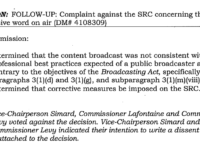Since its introduction in early April, the Online News Act (Bill C-18) has flown below the public’s radar screen. There have been a few op-eds and considerable coverage on my blog (I’ve posted here, here, here, here, here, here, here, here and released podcasts on the bill with Sue Gardner and independent digital media publishers Farhan Mohamed and Jeff Elgie) but Canadian Heritage Minister Pablo Rodriguez has largely been content to rush the bill through the parliamentary process with little debate. In fact, after Rodriguez left the CBC’s Vassy Kapelos visibly puzzled, he has said little about it. He has never given a speech on the bill in the House of Commons and the government successfully cut off debate after allocating just two hours to it. Bill C-18 is now headed to the Standing Committee on Canadian Heritage with hearings that could start as soon as the end of this week.
This post marks the first in a lengthy series that explain why the bill is a bad solution to a real problem. The series starts with posts that examine some of the specifics in the bill, including problematic definitions for making available news, news businesses, and even the definition of news itself. Once I’ve laid the foundation, the series will highlight some of the implications of the bill, including breaches of Canada’s international trade, treaty, and constitutional obligations; the risk it will hamper efforts to combat misinformation; and the plethora of market problems it would create related to government interference, an independent press, competition, and our dependence on big tech.











